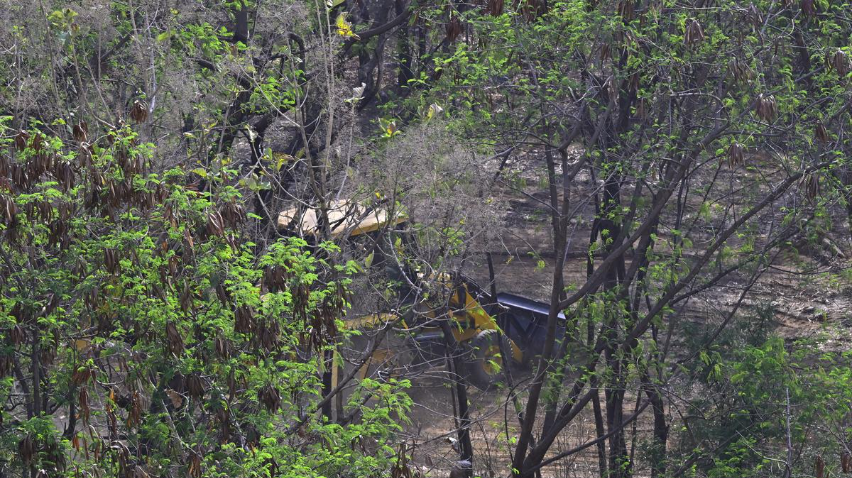Telangana High Court Halts Land Development in Kancha Gachibowli Amid Environmental Concerns
On April 2, 2025, the Telangana High Court issued an interim order halting any further activities related to land levelling and tree cutting in a 400-acre area located in Kancha Gachibowli, Rangareddy district. This land is slated for auction by the Telangana Industrial Infrastructure Corporation (TGIIC), a state government body responsible for promoting industrial growth in the region. The decision came amidst rising opposition from various groups, including students from the University of Hyderabad and other local communities.
The controversy erupted after reports surfaced of heavy machinery being used to level the land and clear trees in preparation for the auction. This has sparked strong resistance from environmentalists, student unions, and several civic organizations who have raised concerns about the potential environmental degradation and the impact on local biodiversity. The 400-acre tract is adjacent to the University of Hyderabad, a prestigious institution in the state, which has led to further concerns about the loss of green spaces and the disruption of educational activities.
Several public interest litigations (PILs) were filed, challenging the land allotment to TGIIC and calling for an immediate halt to the clearing and excavation activities. The petitioners argued that the state’s decision to hand over the land for industrial development without thorough environmental assessments and public consultation was a violation of environmental protection laws.
The petitioners also highlighted that the area in question was home to a variety of flora and fauna, and its destruction would contribute significantly to air pollution and the degradation of the local ecosystem.
The bench, consisting of Acting Chief Justice Sujoy Paul and Justice Renuka Yara, listened to arguments from the petitioners and the Advocate General, A. Sudarshan Reddy, who represented the Telangana state government. After considering the contentions, the bench issued a clear directive, instructing the state government to cease all activities, including land levelling and the cutting of trees, until further notice.
In his remarks, Acting Chief Justice Sujoy Paul emphasized that no destructive actions should take place during this period, especially in regard to tree felling, which he described as particularly harmful. The court’s order to halt these activities until April 3, 2025, marked a temporary respite for the environmental and student activists who had been campaigning against the project.
The court’s intervention is seen as a critical moment in the ongoing struggle between urban development and environmental preservation. The Telangana Industrial Infrastructure Corporation had reportedly planned to develop the land for industrial purposes, possibly auctioning it to private companies interested in setting up manufacturing units. While such developments are crucial for the state’s economic growth, critics argue that they should not come at the cost of the environment or public spaces, especially in areas already facing high levels of urbanization.
The dispute over the Kancha Gachibowli land is not an isolated issue. Hyderabad, like many other major cities in India, faces growing tensions between development and conservation. As the city expands rapidly, natural areas are being encroached upon to make way for new residential complexes, commercial hubs, and industrial zones. The loss of green cover in these areas exacerbates air pollution, reduces the city’s resilience to climate change, and negatively affects the health and well-being of its inhabitants.
Further complicating the situation is the proximity of the land to the University of Hyderabad, which houses thousands of students and faculty members. For many students, the green spaces around the university are a source of solace and relaxation. The destruction of these spaces, particularly in an academic environment, has sparked widespread protests, with students voicing their concerns over the negative effects on their quality of life and education.
The court’s decision to intervene is significant in that it reflects growing public awareness and the increasing pressure on governments to balance development with environmental sustainability. There is a growing realization that unchecked urbanization can have long-term negative effects, and stakeholders across society are calling for more thoughtful and inclusive planning.
Telangana High Court’s order
The Telangana High Court’s order also sets a precedent for future cases involving land use and environmental protection. It underscores the importance of conducting thorough environmental impact assessments and public consultations before proceeding with large-scale industrial or developmental projects. As the case continues to unfold, the court’s role in ensuring that environmental concerns are adequately addressed will likely shape the future of urban development in the state.
As the legal proceedings move forward, the petitioners remain hopeful that the court will take a strong stance against the destruction of the environment, ensuring that future development in the region is carried out responsibly and sustainably. The final outcome of the case could have far-reaching implications, not only for Kancha Gachibowli but for other areas in Telangana facing similar developmental pressures.
Also Read:-
Sikandar Box Office Collection Day 3: Salman Khan’s Action Thriller Faces Slowdown Post-Eid
